Get it fixed today!
Fixing Starter On A Car: Bad Starter Replacement and Starer Motor Repair in Atlanta
Need a New Starter for Your European Car?
Fast, On-Site Replacement for Bad or Failing Starters
Car won’t start? Hear a click but the engine doesn’t crank?
It could be your starter — and we’re here to help. At EuroFix Mobile Mechanic Atlanta, we specialize in fast, professional starter replacement with same-day mobile service that comes to you. Whether you're at home, work, or stranded in a parking lot, our team provides expert diagnosis and on-site installation — no need for a tow or a trip to the shop!
Our mobile mechanics are trained specifically in European makes and models, including BMW, Mercedes, Audi, Volkswagen, MINI, and more. We quickly identify whether it’s your starter, battery, or ignition system causing the issue and get you back on the road. If you're searching for auto starter replacement, starter motor replacement cost, or trying to figure out the signs of a bad starter, you are in the right place. With hassle-free mobile service, competitive pricing with warranty, and expert-level care for your European car, we make the process smooth and stress-free.
What’s Included in a Starter Replacement Service
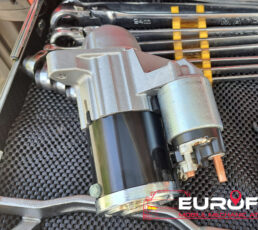
What Does a Starter Do — and Why It Matters for Your Car
Your vehicle’s starter is a compact but powerful electric motor that plays a critical role every time you turn the key or push the start button. When you start your car, the battery sends an electrical current to the starter, which then engages a gear that meshes with the engine’s flywheel. This action cranks the engine — spinning it fast enough to begin the internal combustion process — and brings your car to life.
Without a properly working starter, your engine simply won’t turn over. You might hear a clicking sound, a sluggish crank, or in some cases, nothing at all. And because European vehicles often come with advanced electrical and ignition systems, even a small starter issue can quickly become a no-start situation.
The starter is the bridge between your car's electrical and mechanical systems — and when it fails, you're not going anywhere. That’s why prompt diagnosis and expert installation matter. Our technicians know how to spot starter problems fast, especially in complex European makes like BMW, Audi, Mercedes-Benz, MINI, and Volkswagen.
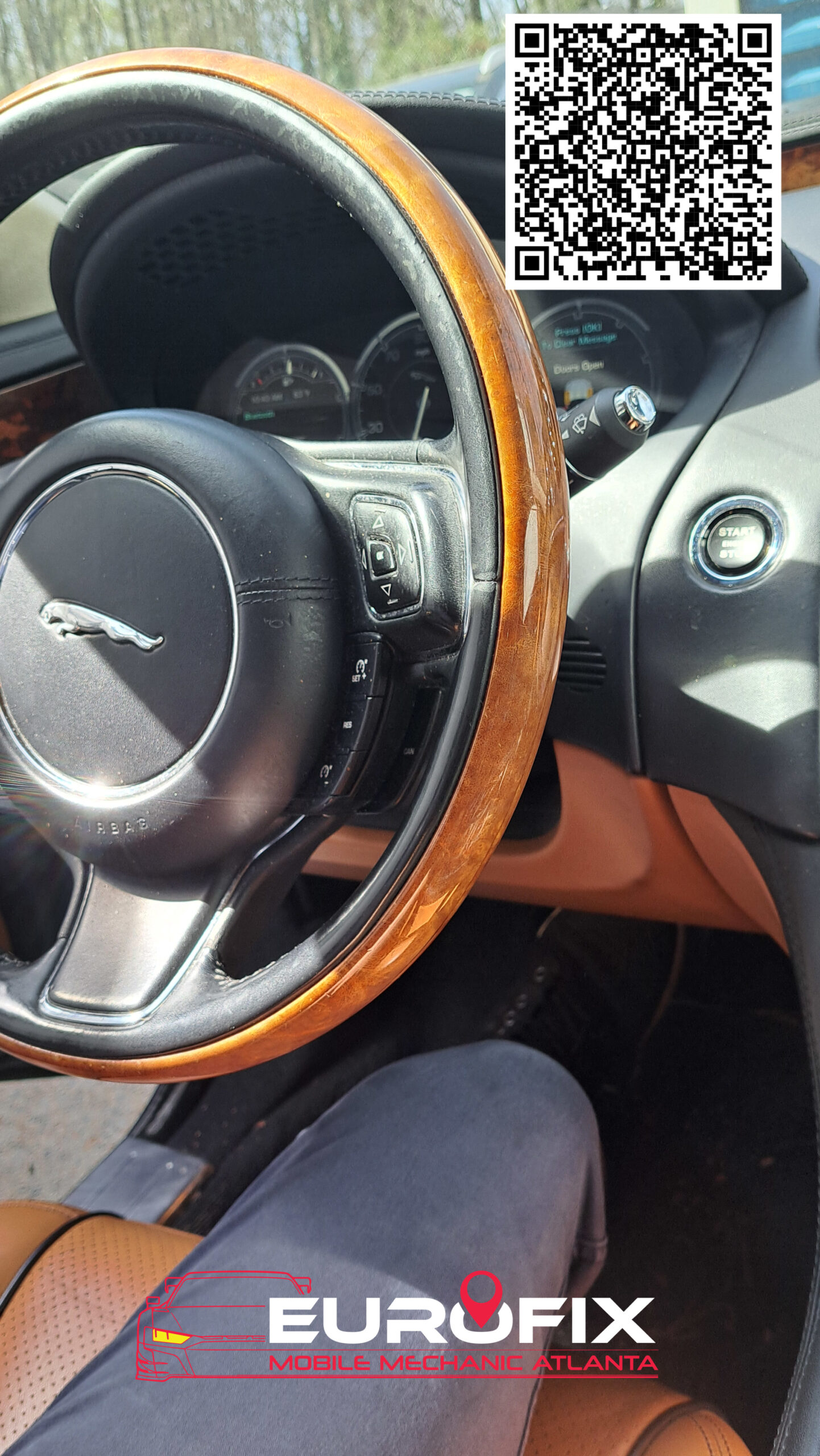
Signs You Might Need a Starter Replacement
Your car not starting doesn’t always mean the battery is to blame. In many cases, it’s the starter that’s failing — and recognizing the symptoms early can help you avoid being stranded. Below are the most common signs that your starter may need to be replaced:
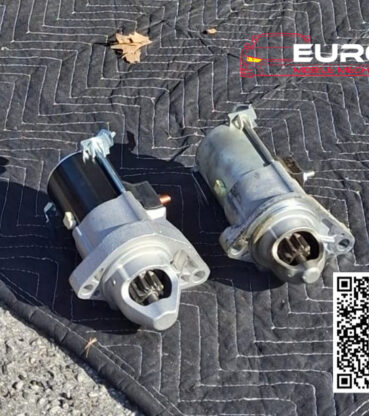
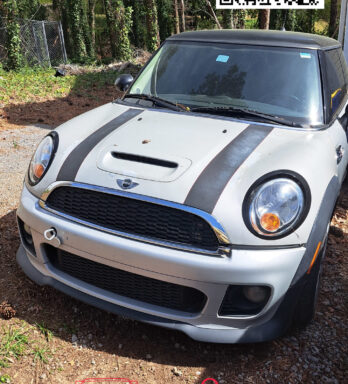
f you turn the key or press the start button and hear a single loud click — but the engine doesn’t crank — this often points to a faulty starter motor or solenoid. Unlike rapid clicking (which typically means a weak battery), a single click is a classic sign that the starter is getting power but failing to engage.
If your battery is new or fully charged, but the engine still won’t turn over, the problem may lie in the starter. The starter is responsible for creating the initial motion to start the engine, and when it fails, nothing happens — even though your lights or radio might still work.
A grinding noise could mean the starter gear (called the pinion) is not properly engaging with the engine’s flywheel. This can wear down both components, potentially causing expensive damage if not addressed. A whirring sound, on the other hand, may indicate the starter motor is spinning but not engaging at all.
If your vehicle starts fine some days and struggles on others — especially when the engine is cold or after sitting — it could be a sign of worn internal components in the starter motor, such as brushes, bearings, or the armature. Intermittent issues often signal that failure is imminent.
If your lights, electronics, or dashboard displays come on when you turn the key, but the engine doesn’t crank, the issue may not be electrical — it may be mechanical. This often confuses drivers into thinking the battery is fine, when in fact, the starter has failed to engage.
What to Do Next If You Notice These Signs
If you're experiencing any of these symptoms, the best next step is to have your starter system professionally diagnosed — especially if you're driving a European vehicle with a more complex electrical system. Our mobile technicians can come to your location, run a quick but thorough diagnostic, and determine whether the issue is truly the starter or something else like the battery, ignition switch, or wiring. Ignoring early signs can lead to being stranded, so don’t wait until it completely fails.
Once we've confirmed that the starter is the problem, we’ll begin by disconnecting your battery and safely removing the failed starter motor.
Some European models require removing surrounding components to access the starter, but our technicians are trained to handle even tight engine bays. We then install a new or OEM-quality replacement starter, torque it to factory specs, and clean up all connections. Once installed, we run a full test to ensure your engine starts smoothly and the starter disengages correctly. With mobile service, we handle everything on-site — no towing, no waiting room, and no hassle.
When to Replace vs. Repair Your Starter
Over time, your vehicle’s starter motor experiences wear and tear that can eventually lead to failure. The starter contains moving parts — such as brushes, bearings, solenoids, and gear mechanisms — all of which are subjected to heat, electrical current, and mechanical stress every time you start your engine.
While some individual components can be repaired or rebuilt, in most modern vehicles — especially European cars with integrated electrical systems — full replacement is often the safer, more cost-effective option.
Common Causes of Starter Failure
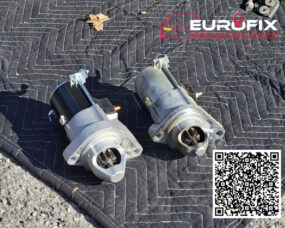
When Replacement Makes More Sense Than Repair
In many cases, repairing a starter may not fully resolve the issue or could lead to future breakdowns if the internal wear is extensive. Replacement is typically the best choice when:
Why Proactive Replacement Can Save You Time and Money
Waiting until your starter fails completely could leave you stranded at the worst possible moment — in a parking lot, driveway, or even on the roadside. Proactively replacing a weak or failing starter ensures peace of mind, especially if you've already noticed early symptoms like slow cranking, clicking, or inconsistent starts.
It’s also a great time to inspect your battery cables, fuses, and ignition components, since they all work together with the starter.
12 Months / 12k Miles Warranty
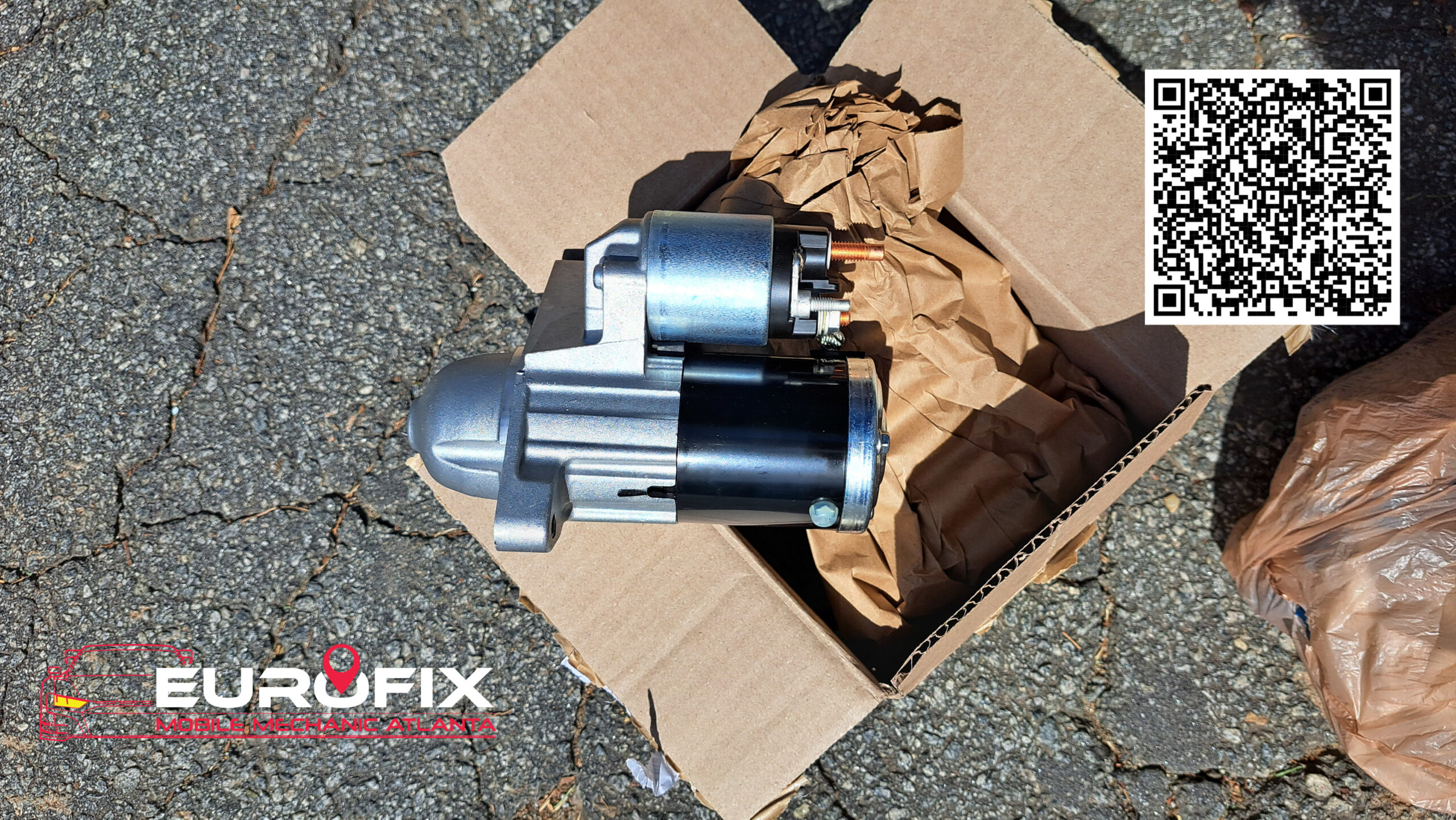
How Long Does a Starter Typically Last?
A well-functioning starter motor can last anywhere from 100,000 to 150,000 miles, but the actual lifespan depends on several factors — including the vehicle’s make and model, how often you drive, and even environmental conditions. In many cases, the starter will last the entire life of the vehicle.
However, if you start noticing signs like clicking, grinding, or slow cranking, it may be on its way out.
European vehicles, especially those with high-compression engines or advanced electrical systems, may put additional strain on the starter, which can lead to earlier wear.
Cold weather, frequent short trips, or starting the car multiple times a day can also shorten the starter’s lifespan.
Some starters fail suddenly, while others show gradual symptoms over time.
Either way, once a starter begins to wear out, it’s often more practical and reliable to replace it rather than wait for a complete failure.
If you're unsure whether your starter is still healthy, we can run a mobile diagnostic to check its performance right at your location.
Is It Safe To Drive With A Faulty Starter?
Technically, yes — but only until you turn the engine off. Once your engine is running, the starter is no longer in use. That means if your car manages to start, you can drive it normally. However, the real danger comes when you shut the engine off — because a failing starter might not work the next time you try to restart your vehicle.
This is especially risky if you're far from home, at work, or parked in a public place. You might come back to a car that won't crank at all, leaving you stranded without warning.
Here’s why continuing to drive with a known starter issue is not recommended:
A starter that works intermittently can fail completely without notice. Even if it starts today, there's no guarantee it will tomorrow — or even later the same day.
Some failing starters can draw excessive current or fail to disengage properly after the engine starts. This can overwork your battery or create additional strain on your electrical system, leading to even more problems.
Starter problems are often misdiagnosed as battery or alternator failures — and vice versa. Driving with a misdiagnosed issue could mask more serious electrical problems or cause further damage.
The good news is that a failing starter is usually easy to diagnose and inexpensive to replace compared to other major components. Our mobile technicians can test your system, confirm the issue, and replace the starter on-site before it becomes a bigger problem.
Searching for "Starter Replacement Near Me?" We Come to You!
If you're searching for starter replacement in Atlanta, trust EuroFix Mobile Mechanic Atlanta to bring fast, expert service right to your driveway, office, or roadside. Our mobile technicians specialize in on-site bad alternator diagnostics and replacement, saving you the time and hassle of going to a repair shop.
We work on all major European makes and models, including:
BMW, Mercedes-Benz, Audi, Volkswagen, MINI, Porsche, Volvo, Land Rover, Jaguar, and more. We also service select domestic and Asian models like Toyota, Honda, Ford, Chevrolet, and Hyundai.
Our mobile mechanics use advanced diagnostic tools to confirm the cause of your no-start condition — whether it's a failing starter motor, solenoid, or related ignition component. Once diagnosed, we install high-quality OEM or aftermarket starters designed for your specific vehicle and test everything on-site to ensure your car starts smoothly.
Serving the entire Atlanta metro area, including Sandy Springs, Buckhead, Midtown, Decatur, Marietta, Downtown, and Brookhaven, we’re the top-rated choice for mobile alternator and starter service.
Call now or book online for reliable, professional alternator replacement service — done right at your location, on your schedule, and backed by warranty.
Save time. Skip the tow. Stay where you are.
Why Choose EuroFix Mobile Mechanic Atlanta for Starter Replacement?
When your car won’t start, you don’t have time to wait around or guess what’s wrong. At EuroFix Mobile Mechanic Atlanta, we make starter replacement fast, accurate, and stress-free — and we come to you. Whether you’re at home, work, or stuck in a parking lot, our mobile mechanics deliver dealership-quality service right where you are.
Here’s why local drivers — especially European car owners — trust us with their starter issues:
Experience Convenient, Reliable Auto Repairs On-the-Go,
Most labor/services backed by 12-month/12,000-mile workmanship guarantee.
How EuroFix Mobile Mechanic Atlanta Works
Get your vehicle fixed in three simple steps - quick, easy, and at your convenience!
SCHEDULE YOUR SAME-DAY
MOBILE CAR BATTERY REPLACEMENT IN ATLANTA
Avoid the busy and expensive shops, we come to your location. Save time and money with our mobile battery replacement service
1 Year / 12k Miles Warranty
When to Call for a Mobile Battery Replacement Service?
Proudly Serving Atlanta and Surrounding Areas
Our same-day mobile starter replacement service is available in all neighborhoods, including Midtown, Buckhead, Sandy Springs, and more. Whether you’re at home, at work, or stranded roadside, we bring the tools, the battery, and the programming — directly to your location.
By appointment only as we are out on the field most of the time
Need immediate car repair? Our mobile mechanics in Atlanta are ready to help!
Frequently ask questions
Mobile mechanics offer the convenience of on-site vehicle repairs and maintenance, often at competitive rates compared to traditional repair shops. Here's an overview addressing common questions about mobile starter replacement services.
How much should it cost to replace a starter?
The total cost to replace a starter can vary depending on your vehicle’s make, model, and engine type — especially with European cars, where access and parts can be more specialized.
On average, starter replacement cost typically ranges between $300 and $1.000, including parts and labor.
Parts: OEM or high-quality aftermarket starters can cost between $150 to $800
Labor: Labor time usually takes 1 to 2 hours, with labor charges ranging from $125 to $400, depending on vehicle complexity.
At EuroFix Mobile Mechanic Atlanta, we provide upfront pricing, mobile service, and warranty-backed parts — so there are no surprises. Contact us today for a personalized quote based on your vehicle.
Can You Jump a Car With a Bad Starter?
No, jump-starting won’t fix a bad starter. A jump can help a weak battery, but if the starter motor or solenoid has failed, extra power won’t help. If your lights work but the engine won’t crank — or you hear a single click — the starter is likely the problem. A professional diagnosis is the best next step.
What can be mistaken for a bad starter?
A dead battery, faulty alternator, bad ignition switch, blown fuse, or loose battery cables can all mimic the symptoms of a bad starter. If your engine won’t crank or you hear a clicking sound, it’s easy to assume it’s the starter — but a full diagnostic is the only way to know for sure.
Will a car shut off if the starter is bad?
No — once the engine is running, the starter is no longer in use. A bad starter won’t cause your car to shut off while driving. However, if you turn the engine off, a faulty starter may prevent it from starting again.
Can a bad starter drain a battery?
Yes, a bad starter can drain your battery. If the starter motor or solenoid is sticking or drawing too much current, it can put extra strain on the battery — especially if you keep trying to start the car without success. Over time, this can lead to a dead battery.
How do you know if it's your battery or your starter?
If you turn the key and nothing happens or you hear a rapid clicking sound, it’s likely the battery. If your lights work but the engine won’t crank or you hear one solid click, it’s likely the starter. A professional test can quickly confirm the cause.
What is most expensive a starter or an alternator?
Alternators are usually more expensive than starters. On average, alternators cost more in both parts and labor, especially in vehicles with complex charging systems. However, pricing can vary based on your vehicle's make and model.
How do I know if I have a bad starter or a bad alternator?
If your car won’t crank but lights still work, it’s likely a bad starter. If the car starts but then stalls, or the battery keeps dying, it’s likely the alternator. Grinding sounds often point to the starter, while dimming lights and electrical issues usually mean alternator trouble. A diagnostic test can confirm the issue.
What is the biggest cause of starter motor failure?
The most common cause of starter motor failure is wear and tear from repeated use, especially on internal parts like the solenoid, brushes, or pinion gear. Other major factors include heat damage, oil leaks, corroded connections, or voltage issues from the battery or alternator.
Will the Starter Click If the Alternator Is Bad?
Yes — but indirectly. A bad alternator can cause the battery to lose charge over time. If the battery is too weak, you may hear a clicking sound when trying to start the car — but the real issue is the alternator not keeping the battery charged, not the starter itself.
Is It My Starter or Ignition Switch?
If you turn the key and nothing happens at all — no click, no crank, no lights — it could be a bad ignition switch. If the dash lights come on but the engine only clicks or cranks slowly, it’s more likely a bad starter. A proper diagnostic test is the best way to tell for sure.
How often should a starter be replaced?
There’s no set schedule, but most starters last on average between 100,000 and 150,000 miles. Some last the life of the vehicle, while others wear out sooner due to driving habits, engine type, or electrical issues. Replace it when you notice signs like slow cranking, clicking, or failure to start.
Do starters go bad suddenly?
Yes, starters can fail without warning — especially if an internal component like the solenoid or motor burns out. However, many give signs first, like intermittent cranking, clicking sounds, or slow starts. If you notice these early symptoms, it’s best to replace the starter before it leaves you stranded.
